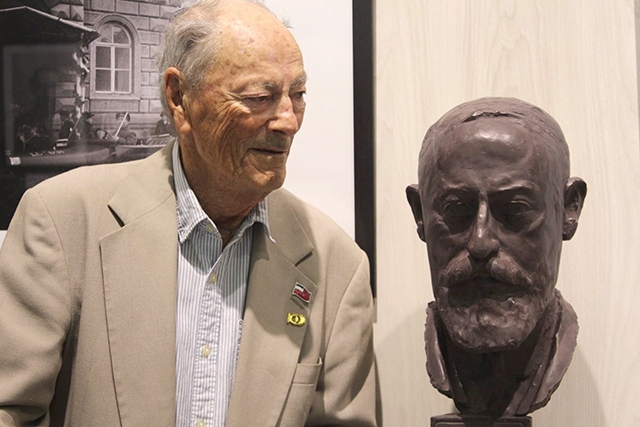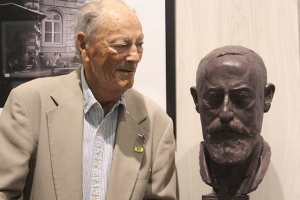The Most Interesting Man in Springs
Redjeb Jordania would be the first to tell you that he has lived a good life so far, though it may be more accurate to say he's lived several good lives. Jordania, who will be 98 this December, has been, at various points: a pianist, a sailor, a barkeep, an academic, an author, a boatbuilder, and something of a celebrity. He has hunted boar in Dagestan, played music on a barge on the Seine, spent time in jail in San Sebastian, composed symphonies in Munich and sailed the Turkish coast on a catamaran.
As he nears the summit of his first century - a period spanning I7 US presidencies, World War II, Hiroshima, the Civil Rights Movement, the moon landing, the advent of color television, the jet plane, the computer, and the internet (more things, he jokes, than could ever be kept track of), Jordania reflects on the choices, chance encounters, and twists of fate that led him, at last, to the East End.
Charming in conversation, always ready to laugh, he has expressive blue eyes that twinkle as he talks about his boyhood in Paris. His voice is warm, with a deeply-textured French accent. Jordania speaks English, Spanish, French, a bit of Georgian, and "a few choice words" of Russian.
Sitting down in the sunny living room of his house on Driftwood Lane in Springs, Redjeb begins by saying, with a wry half-smile, “Whenever people want to talk to me about my life, I first have to ask, Which one?"
To begin at the beginning, Redjeb comes from interesting stock. His father, Noe Jordania, was the President of the short-lived but politically significant pre-Soviet Democratic Republic of Georgia. Redjeb's birth coincided with a moment of crisis, both political and personal, for the Jordania family. As the Soviet Union gained power, the young country was taken over by the Bolshevik Army, and the family was exiled to France.
Redjeb was born in Paris in 1921. As a boy, he spoke French and received a formal European education, studying classical music, literature, and mathematics. He was a good student and excelled particularly at the piano. As a young man, he taught music composition and traveled widely through Europe, enjoying many adventures. Once, while visiting a friend in Spain, he was mistaken, due to a similarity in name, for a K.G.B. general and spent several nights in jail in San Sebastian (an experience he recalls today as "not so bad" and "actually sort of interesting"). Upon his release, he went to Ibiza, where, inspired by the area's natural beauty and low cost of living, he decided to open a bar. The bar, which he named “The Oasis,” quickly became a haunt for expats and artists. One of his regular customers was a young American woman, with whom, in 1960, he moved to New York.
A lifelong man of letters, he studied for a master's in French Literature at Yale in the 1970s, but, while writing his dissertation, found himself growing frustrated and distracted, eager to leave the library and get out into the world, to do something with his hands. "It was too heady," he reflects. "All those years with my head in a book finally got to me, so I decided to ditch school and build a boat that I could travel around on."
Having never built a boat before, Jordania committed himself with newly revitalized academic zeal to learning everything he could about the subject. With the Yale library at his disposal, Redjeb scoured the stacks for books on boatbuilding and embarked on the construction of a sailboat, which he built in the living room of his student apartment in New Haven.
While his intention had been only to build one boat, in the process, he fell in love with the art of boatbuilding. The craft. The solitude. The feel of the wood in his hands and the bright, muscular smell of resin. Every new design was a puzzle to solve. After graduating, he took a job at the South Street Seaport Museum in Manhattan, where he taught classes and frequently sailed in New York Harbor.
In 1984, at the age of 63, Redjeb was living in Lower Manhattan with his partner, Peggy Backman, when he heard about a job opening for a boatbuilder at the Marine Museum in Amagansett. "I drove out to see the place and it was a beautiful old barn right near the water," he says. "I accepted the job immediately. It was a dream. My title was 'director' but I was the only employee, so I spent my days alone building boats and occasionally teaching students. It was wonderful."
Jordania has hardly slowed down since moving to the East End 35 years ago. He has written two books: ‘All My Georgias,’ a memoir about returning to his family's homeland, and ‘Escape from the South Fork,’ which is a sort of a hodgepodge collection of essays and short fiction. The latter contains several heartfelt essays about his life on Long Island as well as a meditation on the thrill of young love and a short story titled ‘My Mother Was a Cat.’ As a writer, Jordania is quick-witted and lyrical, qualities that reflect his personality, and he demonstrates keen literary instincts.
Another story, ‘Closing the Circle,’ tells of his visit to the Jordanias' hometown in Georgia in 1990. Reflecting on his experience in Georgia, Redjeb says, "It is a complicated feeling. Longing and connection for this place where I never lived but where my roots are nonetheless very deep. It wasn't an easy feeling, but it was meaningful. So it goes."
So it goes. One gets the impression that this easygoing attitude may be a key to Jordania's vitality, and longevity. He is uncommonly loose-limbed for a man so near his 100th birthday. Jordania claims never to have followed a strict diet or workout program of any kind. When asked what he does to maintain his health, he responds, "I drink a lot! I'm joking. But really, I used to drink a huge amount. And smoke, too. But those days are behind me. In truth, I think I have always had a good understanding of my body and its limits."
When asked what is next for him, he says, "We'll see. Life is long."
By Nina Channing
Image source: archive.gov.ge/











